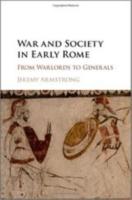
CUP (2016) h/b 317pp £64.99 (ISBN 9781107093577)
This is an ambitious but unconvincing attempt to create a ‘paradigm shift’ in study of the emergence of the Roman republic (6th to 4th centuries BC) through the prism of military developments. The challenge is real: there is no consensus on how reliable and usable the Roman tradition is. Against the believers, Armstrong and others claim later Romans misunderstood early Rome as a prototype of their own republic. His alternative is that the stories of the fall of the monarchy and the Struggle of the Orders mask the emergence of a Roman state through a gradual accommodation between mobile Latin warlords with their followers, that is the patrician gentes, and the plebs who were the urban inhabitants of Rome, with crucial bursts after the expulsion of the kings in 509 BC and the Gallic sack of 390 BC. A third watershed was the subjection of the Latin League to Rome in 338 BC. Thus A.’s republic began in the early fourth century BC (p.17 wrongly says third century!).
A fundamental problem with A.’s approach is that, despite his basic assumption of misunderstanding and his sceptical chapter on the evidence, he accepts the traditional narrative. Thus the fall of the kings and the Gallic sack are taken to be plain facts, and he accepts the fantasy that Livy’s account of the sack is ‘the most comp<l>ete’ because as a Paduan he knew the Gallic tradition. A second problem is that no point is discussed properly anywhere, but issues like the nature of the rex (king?) recur in different chapters, often with different interpretations—the centuriate assembly, for instance begins after 509 (p.132) or after 367 (p.279). Indeed the book proceeds mostly by assertion, supposition and repetition. Some crucial matters are never explained, such as his identification of plebs with the urban population, which must then have been so small that they would have been of marginal importance (A. also follows the uncertain view that only the patricians had gentes), and his frequent allusions to the Latins as part of the Roman community, when they were surely independent peoples (and not a political League).
This is all frustrating, because the view that Rome gradually developed from dominance by warlords to a form of collective government increasingly regulated by the people is probably what did happen, albeit starting much earlier. And there are nuggets in the mud, such as the observation that later Roman historians, familiar with exclusive citizenship, could not comprehend the mobility between cities of warlords like Coriolanus and so invented stories of trials and exiles to make sense of it.
Dominic Rathbone
